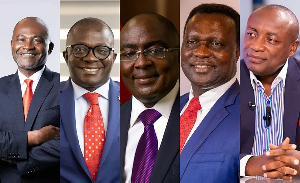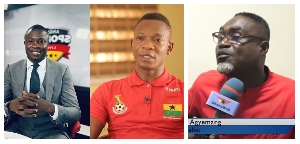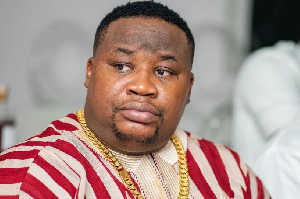Part 3
Dan Botwe has an excellent chance to win the nomination as NPP Presidential Candidate on December 22, 2007. More than any other presidential aspirant, Botwe shares the values and aspirations of the delegates who will make the selection that day. When the commotion, confusion, and cacophony of the multiple campaigns die down, and the delegates reflect soberly in the secrecy of their voting booths, they will identify with and vote for Dan Botwe, the man who helped to bring a winning culture to the party and has demonstrated exemplary leadership skills, unflinching party loyalty, and sacrificial service to the party. No candidate has more passion for the party and more compassion for the grassroots and foot soldiers than Botwe. A leader with a winning combination of organizational skills and strategic thinking, Botwe has worked with many of the potential delegates in the past, and they know that he is the best aspirant to energize and invigorate the party to victory in 2008.Albert Einstein, one of the world’s greatest scientists, once said that problems cannot be solved by the same level of thinking that created them. Many Ghanaians agree that there are several problems in Ghana militating against the country’s development and that we need to make changes if we are to develop to a satisfactory level. Ghana has been politically independent since 1957, but has not grown economically to the level of some of the other countries which gained independence around the same time and are no more endowed with human and natural resources than us.
Einstein was right. One requires a different or higher level of thinking to solve Ghana’s problems. We need to rethink our problem-solving techniques and leadership selection criteria in order to bring leadership and sound decision-making into alignment. Sadly, some people keep supporting and choosing the same calibre of leaders based on archaic criteria and wonder why Ghana is like a 50-year old child in terms of economic development. Ghana must grow. Independence must lead to emancipation. For example, we need to free ourselves from the shackles of foreign aids with their strangulating and suffocating terms and conditions and take control of our own destiny. We have a high rate of unemployment among our youths and yet we send abroad the bulk of our unprocessed cocoa beans and other resources, and lose significant employment and value-added opportunities. We have thrown ourselves at the mercy of nature and keep monitoring the water level in the Akosombo Dam to determine whether we will live in darkness or run our industrial machines. We are too smart a country to be caught in this unfortunate situation for this long.
Our concept of leadership, priorities, and policies must change. However, changes that transform a country do not happen by chance. We have to work hard and make difficult choices for them to happen and the time to do so is now, starting with our choice of leadership. Transformational changes require a new brand of leadership, the kind that would inspire confidence in Ghanaians first, and then the private international community, to actively invest in our country and create business opportunities and employment for our youths. We need a leader who is a changer, a leader who will set the right priorities and implement the right policies that will result in transformational changes. We need a courageous, performing leader with an uncanny ability to defy the odds and achieve the best results for Ghana and Ghanaians. This is the kind of leadership that Botwe is ready to offer the country as outlined in his Declaration Speech on October 31, 2007.
There is an old Ghanaian proverb that is analogous to Einstein’s statement. “Y?nnyina nkrane mu ntete nkrane.” That is, we do not stand in the middle of a swarm of soldier ants to remove other soldier ants that have crawled on the body. If we did that, many more soldier ants would crawl on us than we could remove them. In other words, we cannot solve our problems adequately when we are still part of the problems. It is possible that some of those who claim long years of ministerial and government experience may have been part of the problems we face today. If so, it is highly unlikely that the same people, entangled by their roles in the past, can even see the problems, let alone solve them. Changes, transformations or reforms cannot be planned, formulated, and executed successfully by those who have been an integral part of the status quo. That is why successful executives and managers of large corporations hire outside consultants to examine their companies and propose solutions. Those executives and managers realize that they may be standing in a swarm of soldier ants and need someone to pull them out and help them remove the soldier ants that have crawled on them. That is also why large corporations sometimes go outside to employ chief executives instead of promoting from within. We need a new brand of leader like Botwe whose vision is not blurred by long years of government appointments, who has spent the most time with the party faithful, and who can objectively identify the problems facing the masses and address them.
It is time for a generational shift in Ghana’s leadership structure. It is time to set aside some of our old ideas and make room for a new generation of leaders. We cannot do things the same old way and expect significantly better results. More of the same has not taken us very far. Unlike our new Ghana Cedi, we do not want the value to be the same. We want more value for our votes because we deserve better leadership. Despite our many problems, we have had some notable achievements. Ghanaians have set the standards for citizens of other African countries to follow when it comes to governance. We were the first in Black Africa to attain political independence and we did it relatively peacefully. We have shown since 1992 that democracy can work in Ghana and Africa and that we can peacefully transfer power from one government to another government of a different party. We have maintained relative peace in our country. These are credits to all Ghanaians. However, we are now at a critical juncture in our political journey. We have the chance to lead the way again by being the first to reject money politics and political godfatherism that have crept into our African body polity. We also have a choice to either continue on the same path of gradualism and take comfort in our modest economic achievements for the last 50 years, or make a bold turn for fundamental and transformational changes with a progressive, visionary, and dynamic leader like Botwe.
This is not the time to indulge the fantasies of those who believe that some aspirants’ time has come while others should wait their turn. We do not accept that Ghana’s progress lies in the hands of a select few who are on a phantom list in a predetermined succession plan. The argument that tradition requires that older aspirants be given the first chance has lost its force in our modern world. There is no longer a strong Ghanaian customary, cultural or traditional support for it. Our traditional rulers and elders who are the custodians of our tradition have long abandoned rigid preference for old age. For example, another old Ghanaian proverb says that “y?rewo ohene na panin te ase” or "onukpa tashi dane afo mantse." That is, before the chief was born, there were elders. Yet, when the time comes for the chief-to-be to ascend the throne, the elders do not say that he should let them rule first since they are older. There are many chiefs in Ghana today who are neither the oldest of their parents’ male children nor the oldest of the eligible royals in the extended royal family. Character, personality, education, leadership skills, and qualities other than age, have been used to select some of the best chiefs in Ghana. An example is the Asantehene, Otumfuo Osei Tutu II, who is the youngest of his mother’s children. The King of Asante, who ascended the Golden Stool on April 26, 1999, at the age of 48, has, within his short reign, elevated chieftaincy in Ghana to the highest international levels, to the point where some of us are beginning to show interest in the institution.
In addition, if we turn to Judeo-Christian tradition, two of the greatest Kings of Israel, King David and King Solomon, were selected over their much older brothers. In the case of King David, the selection process was a little dramatic and may be likened to our current situation. Seven sons of Jesse were paraded as aspirants before the Prophet Samuel for Samuel to select one of them as King. (1 Samuel 16). When Samuel thought he had found one of the aspirants to be the King, the Lord told him not to look at appearance or height. None of the seven aspirants was found suitable for the gigantic task ahead. Initially, David, the youngest of the brothers, was not considered an aspirant so he was not even given a chance to parade before Samuel. He was considered too young and was outside taking care of sheep. When Samuel, who himself was called by the Lord at a very young age, asked whether the seven were the only sons, Jesse casually sent for David and he was selected as King. And what a great King he became! It is interesting to note that the qualities of caring and compassion for the sheep which prepared David for his leadership role, have been demonstrated over the years by Botwe with the NPP grassroots and foot soldiers. Today, the presidential aspirants are parading themselves before the potential delegates and other Ghanaians. Many appear and sound presidential. However, like the David situation, appearance can be deceptive. Could it be that the NPP delegates would realize, when they are secretly casting their ballots, that there are Goliaths of problems facing Ghana and that the country needs a David, this time called Dan, to solve them? I hope so! Old age certainly has its place of honor in our culture, but its importance should not override other considerations when we are selecting the president of modern Ghana in the 21st Century.
I received several e-mails after Parts 1 and 2 of this Article were published on Ghanaweb on October 3 and 23, respectively. All the e-mails contained positive and enthusiastic endorsement of Botwe’s candidacy, except one from a gentleman in U.K after he read Part 1. I responded and thanked him for his comments. However, after reading Part 2 of the Article, the lone dissenting voice wrote another e-mail informing me that I helped to change his mind because he became convinced that Botwe has all the necessary qualifications to become an excellent president. Like many others, the gentleman was initially under the wrong impression that to be an effective president of Ghana, a person must have held numerous government appointments over a long period of time. His initial thought did not appreciate the importance of political leadership which has been superbly demonstrated by Botwe over the years. Leadership is the crux of the nomination process, not old age or number of government appointments held. Leadership, backed by solid performance and beneficial results, is the key, and Botwe holds a big part of that key in Ghana today. Hopefully, you will change your mind, too, if you do not already support Botwe.
Dan Botwe’s victory train is taking off slowly but surely and will reach its intermediate destination at Legon on December 22, 2007. Do not let the victory train pass you by and miss the opportunity to be part of destiny because Dan Botwe, the man of destiny, is on that train appealing to you to join him. Please get on board and use all means reasonably necessary to support or vote for him. In the words of Dan Botwe, the time is now.
No matter what the outcomes of the December 2007 Congress and the 2008 General Elections may be, the peace, unity, and progress of our dear country should be the number one wish and prayer of all Ghanaians. May God bless Ghana and all Ghanaians. Thank you very much.
Merry Christmas and Happy New Year.















